
Google Ranking Dropped Dramatically? – How To Recover
Many marketers are suffering from SEO ranking drops on their affiliate sites or rank and rent websites in July 2024.
We have round-up up the 5 Main Reasons Why Your Google Ranking Dropped Dramatically and How to Fix Them.
It’s normal for your site’s organic rankings to drop a search position or two on Google search engine result pages (SERPs).
But when your rankings drop from a page or two (that’s at least ten positions), if not more, you should start worrying.
If your website is struggling from a sudden drop in rankings you might want to check out our saying “it is only a problem when it is a problem – and then it is too late”.
Different factors cause a site’s dramatic Google ranking drop. Unfortunately, search engines won’t tell you why the SEO ranking drop most of the time.
So, you’re on your own to figure out why your Google rankings suddenly dropped as you continue losing organic search traffic.
Thankfully, this post discusses the common reasons that explain your site’s drop in organic ranking and how you can try and fix it.
Contents
- Why has my google ranking dropped?
- #1 – Lost Crucial Backlinks
- #2 – Received a Manual Penalty
- #3 – Got Bested by the Competition
- #4 – Made Technical Changes to Your Site
- #5 – Targeted by an Algorithm Update
- How to get google rankings back if your positions dropped?
- Conclusion
- Searches Associated With SEO Ranking Drops
Why has my google ranking dropped?
Google rankings can drop suddenly for the following reasons:
- Lost Crucial Links in your Backlink Profile
- Received a Google Manual Action Penalty
- Competition Beat You Out
- Technical Changes Affected Rankings
- Algorithm Update
We explore in more detail why each of these reasons can dramatically drop your traffic to your website.
#1 – Lost Crucial Backlinks
Backlinks are one of two ranking factors that play a crucial role in your site’s SEO performance (the other one is content).
Think of backlinks as personal recommendations. If a website links to you, it trusts your site and wants its readers to check you out.
That said, not all backlinks are equal. Like recommendations, some links carry more weight than others, especially if it’s coming from an authoritative site.
A link from Facebook (which is next to impossible to get, but let’s just pretend for a moment) is much more valuable than a thousand backlinks from unknown sites combined.
That’s because Facebook has established itself as arguably the most popular social networking site on the planet, with millions of daily active users.
So, it’s only natural that search engines will rank your website higher for your target keywords simply because of the backlink you have on Facebook.
And by building more backlinks from high-quality websites, the faster your site will reach the top of organic search.
To help you identify which backlinks in your link profile are the most important, use a tool like SEMrush. Enter your domain URL and click on Link Building > Backlink Analytics to see all the links you’ve built thus far.
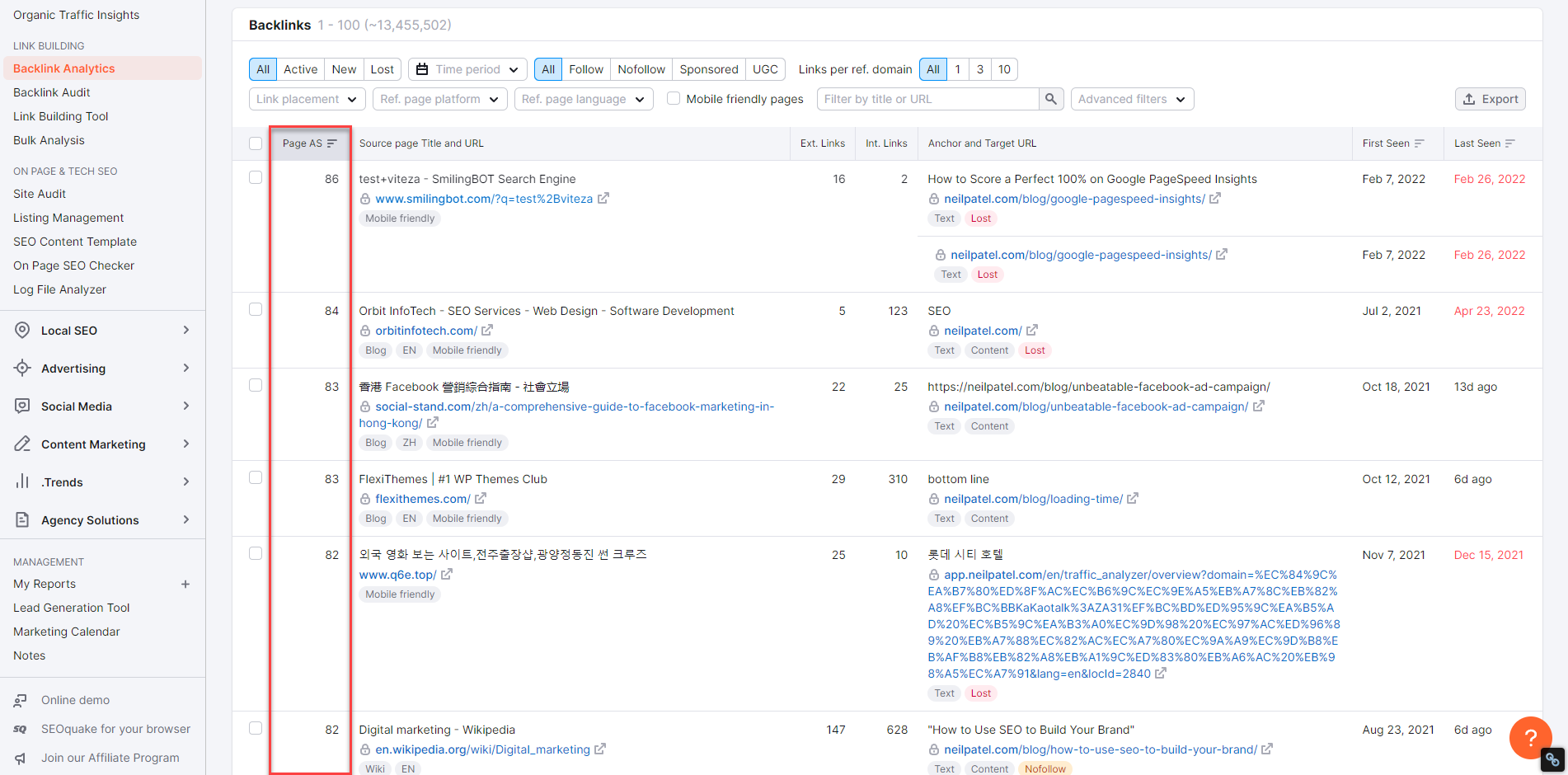
The backlinks are organized according to their Page AS (Authority Score), which measures overall URL quality and influence on SEO based on its link profile, content, and other ranking factors.
The ones that appear on top are your most crucial backlinks. Following the Pareto Principle, the top 20% of sites with the highest page AS score produce 80% of your link profile. So, expect your rankings to drop if you lose these.
Suppose you find out that your rankings dropped. Head to the same page on SEMrush. However, click on the Lost tab this time to isolate the backlinks you lost in that period.
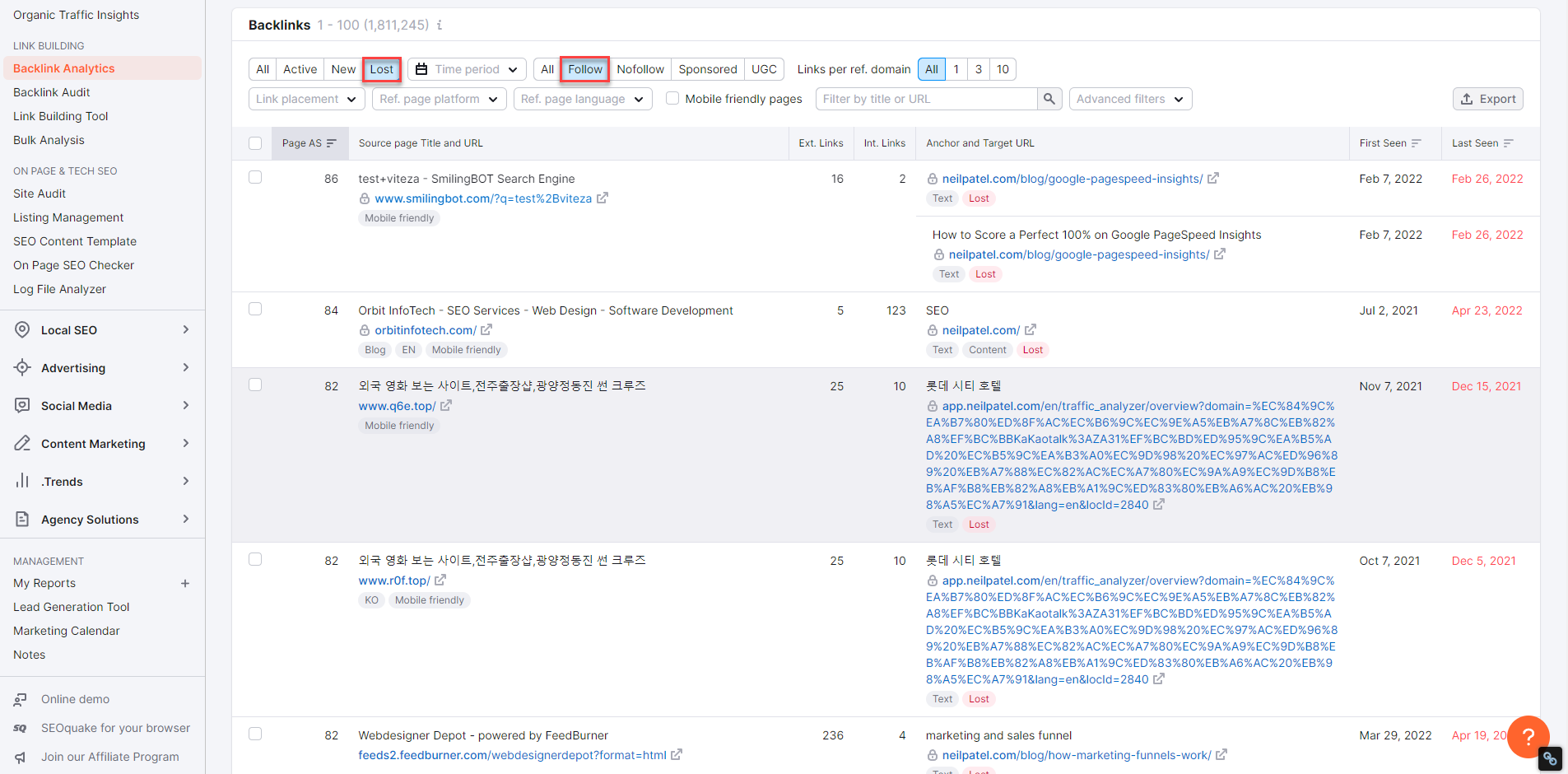
You may also want to click on the Follow tab only to show you backlinks transferring link juice or Page Rank to your site.
From here, you have to check the site to make sure that your link isn’t there anymore or was there in the first place.
Once you’ve identified the crucial backlinks your site lost, you should at least try and recover them back.
If the site is still operational, send an email asking the owner to put your link back in.
You could send them a guest post or link to their site from other websites you own as an incentive.
Unless the backlinks you’re trying to reclaim are essential to your Google rankings, the latter is unnecessary.
#2 – Received a Manual Penalty
As mentioned, some backlinks help your site’s SEO much better than others.
But some links outright harm a website to the point that Google hands it a manual penalty.
A manual penalty refers to Google (either one of its employees or its algorithm) reviewing your website and deeming that it violates its Webmaster Guidelines.
If you are suffering from a penalty you need to consider hiring a professional manual action removal specialist.
To know if your site was manually penalized by Google, check Google Search Console for a message similar to the screenshot below:

“Unnatural links from your site” is the most common Google penalty a website can receive.
Two Reasons Why Your Site Got Hit with an Unnatural Backlinks Penalty
#1 – Your Bought Spammy Backlinks
Link buying is prevalent in the industry. And no matter what Google says about buying links, it remains the easiest way to climb up organic rankings if done right.
The last part is essential because it’s easy to make critical errors when buying backlinks or even building them yourself.
Google can catch you with manipulative backlinks by spotting private blog networks (PBNs) and tracing their footprints.
Penalizing these networks will cause a domino effect that will penalize your site, assuming that you have backlinks from these networks.
PBNs remain an effective link building tactic if network owners only know how to hide their tracks properly to prevent Google from uncovering their patterns.
That said, you don’t want to get links from PBNs unless you know what you or the vendors you’re ordering links from are doing. Else, you’ll receive a manual penalty and put your entire website at risk of ranking ever again.
#2 – You Were Hit with Negative SEO
On the flip side, it’s possible that someone else (most likely a competitor) paid someone to build bad backlinks to your site.
Negative SEO is real. Public case studies like this one from Kinsta show that spammers use black hat SEO techniques to decrease a site’s rankings on Google.
This SEO type is common among large and popular sites where their content is scraped and republished on low-quality sites. By scraping the content, the internal links in the article become backlinks to one’s site once published elsewhere.
Usually, Google would ignore these spammy links and focus on your other links. But if the bad backlinks affect your overall rankings, it’s time to take matters into your own hands.
SEMrush has a Backlink Audit feature that allows you to compute the toxicity of your backlink profile.
Once you’ve set up the audit by connecting your Google Search Console with SEMrush, you should be able to view the report in a few minutes.

From the results, filter those with the highest toxicity scores (between 60-100) to see your site’s bad backlinks. Then visit the site first to confirm if it’s spammy and linking to your website.
Next, try and reach out to these site owners asking them to remove the link to your site. There’s a slight chance they’ll comply, but it’s best to ask anyway.
If your requests fall on deaf ears, it’s time to disavow these links. This aims to devalue all the links you have from their domains.
This is a heavy-handed approach to dealing with bad backlinks and should be your last resort if the links are doing more significant harm to your site’s rankings.
#3 – Got Bested by the Competition
SEO is a competition through and through.
There will be sites that rank on top of search results for money keywords.
The good thing about this is they won’t stay up there forever.
The Google algorithm always updates to ensure that it provides users with the best pages for every search query.
As a result, the updates may cause a sudden shift in search rankings.
That means other sites can supplant the top spot holder for profitable keywords after the Google algorithm update.
The same applies to you. You can work your way to the top spot for your keyword or lose it to another site just as fast.
The assumption here is that you neither built any suspicious links to your site nor experienced a negative SEO attack.
So, if you lost ground on Google SERPs, it’s probably because your competitors delivered something that Google’s algorithm is looking for.
Three Reasons Your Competitor Beat You
#1 – Competitors Built Better Links
First, your competitors built better backlinks over time, causing Google to favor them on SERPs instead of yours.
To help you better understand Google SERP for the keyword you’re targeting, you need to check the pages’ SEO metrics.
Using a tool like SERP Checker by Mangools, enter your keyword on the text bar. It will then show you the top-ranking pages for the query and SEO metrics such as Moz’s Domain Authority (DA), Majestic’s Flow Metrics (TF and CF), and others.
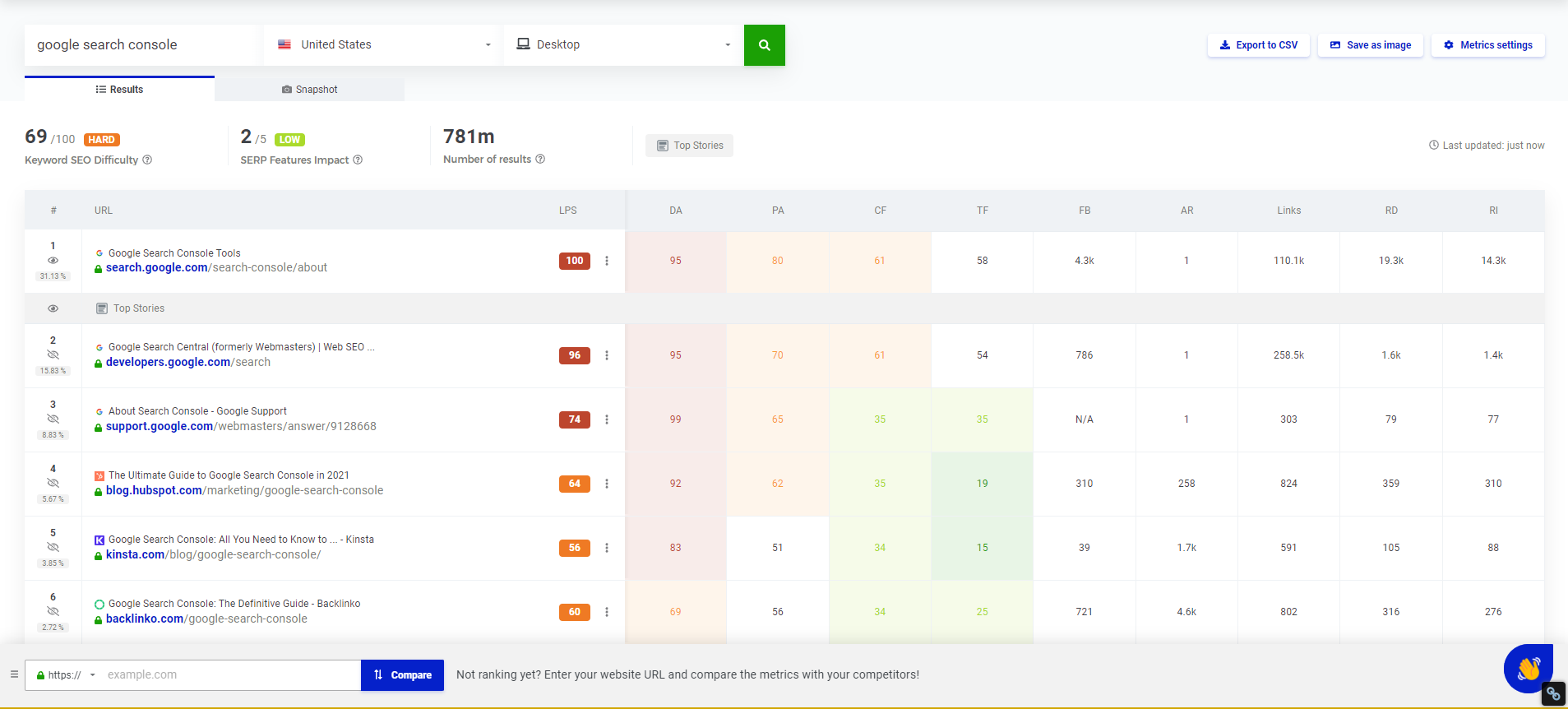
From here, you can compare the metrics with those of your site page to help you understand why your rankings dropped.
Maybe your competitors have more backlinks and referring domains than yours. You can see the page’s authority based on the quality of links using SERP Checker’s Link Profile Strength (LPS).
#2 – Competitors Created Better Content
You may also attribute your drop in rankings due to the content quality of higher-ranking pages.
Aside from providing more value to readers in the content, they also optimized their content not just for a keyword but a corpus of related terms. This helps increase the page’s topic relevance for the terms it’s targeting,
To help you analyze their content, use Surfer SEO first to identify the Content Scores of each ranking page using SERP Analyzer by entering the keyword.
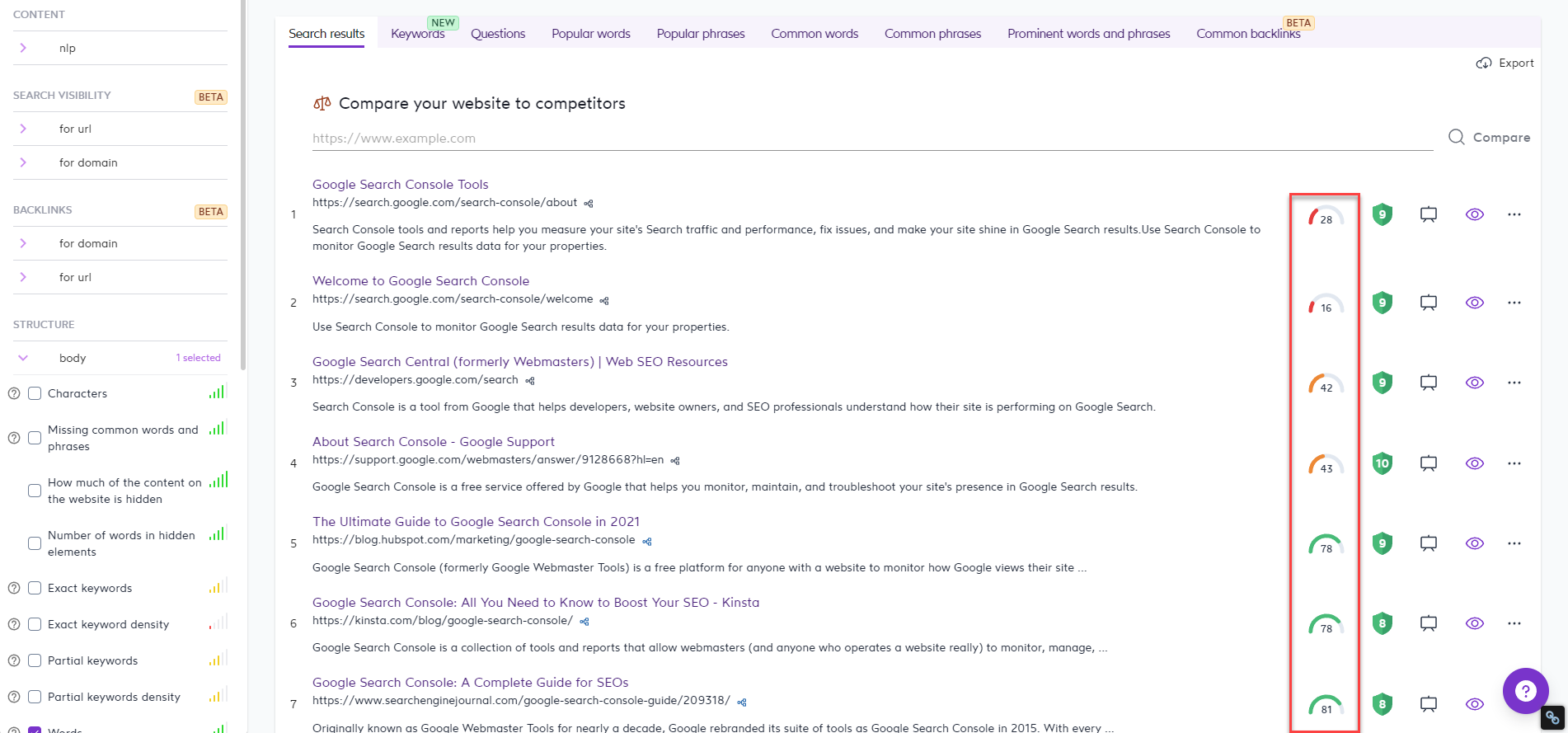
Using this feature helps you understand how relevant content ranks these pages.
For the search term “on page optimization,” we can see that most pages ranking for the term have high Content Scores, as indicated by their green color.
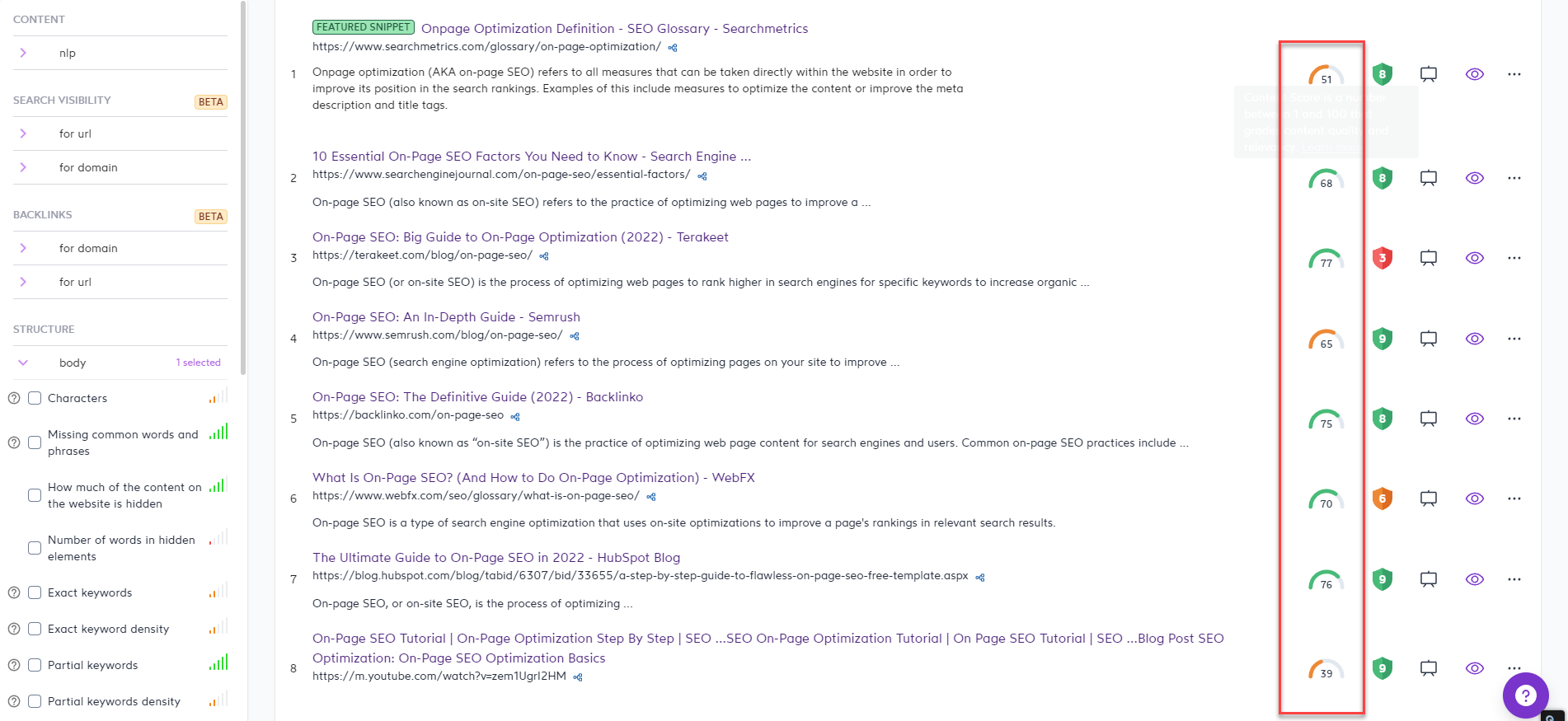
Aside from its Content Score, you can also see the Domain Score just beside the Content Score to the right. Again, similar to SEMrush’s AS, this shows how authoritative the domain is based on multiple SEO factors.
On the left side of the page, you’ll also see content elements and their relevance to the ranking page.
A higher correlation shows green, which means you have to consider when writing or editing your content.
To help you visualize the data, check the boxes of the elements you want to recreate into a line graph.
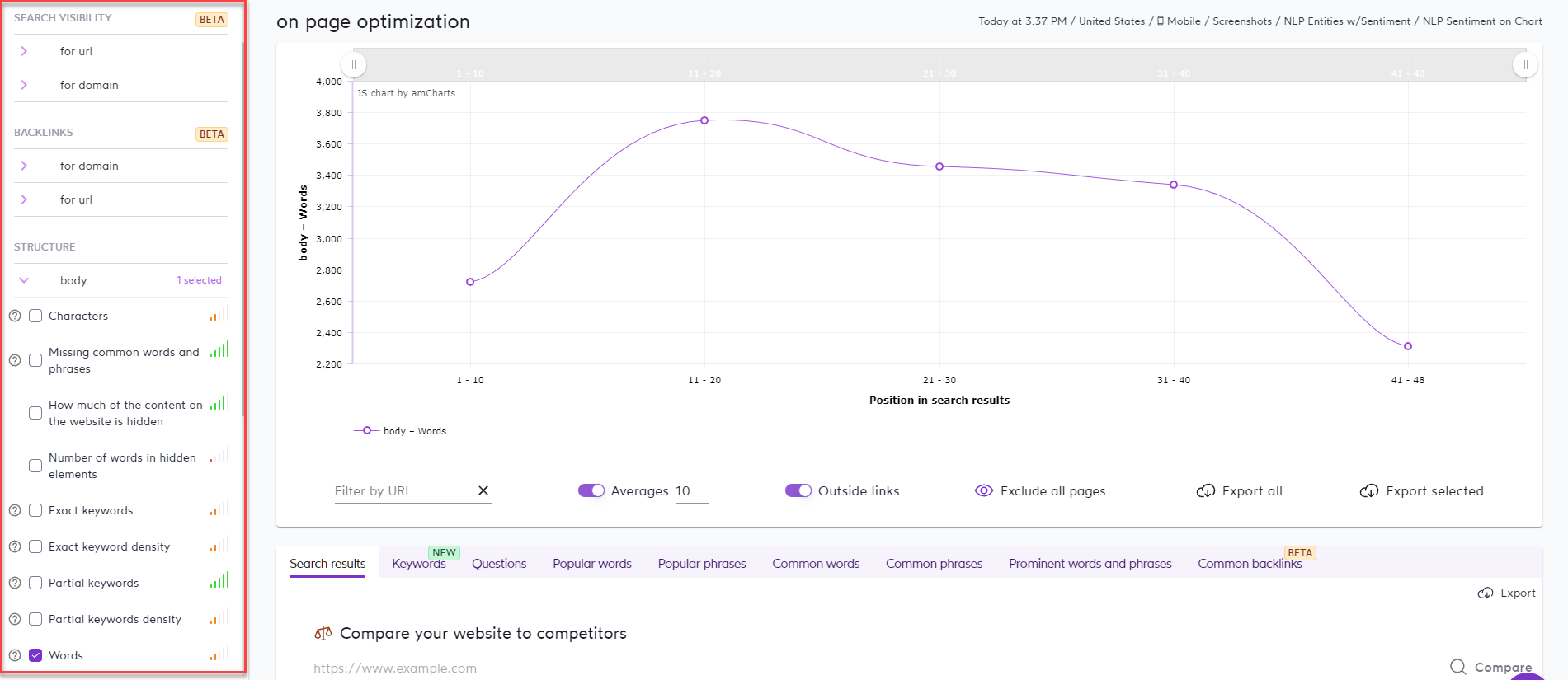
In the screenshot above, the box for the number of words is checked to show you the graph.
As you can see, the pages ranking on the first page of the term have a lower average word count compared to the latter ranking pages. This means you shouldn’t focus too much on word count and look at other elements for which to optimize instead.
Finally, use its Content Editor to help you create better site content on par with those ranking on top.
Since your rankings dropped, you want to edit your content to increase its Content Score and hopefully get it back to the top of SERPs.
Content Editor has a feature where you can enter the URL of the page you want to optimize. Surfer SEO will then optimize them for the text corpus you will enter.

To be clear, there’s no guarantee that your site will magically get its high rankings back after doing these. But at least you’re trying to deliver what Google is looking for on SERPs.
#3 – Keyword Changed its Intent
There are times that your site page isn’t supposed to rank for a particular keyword, but it does anyway. It’s a happy accident that drives loads of traffic to your website.
Until Google pulls the rug from under you and drops your page from SERPs.
This is not necessarily a cruel joke that Google pulls off regularly. Nevertheless, it is subject to mistakes as an algorithm.
In this case, it’s primarily due to the ambiguous search intent of specific keywords.
For example, if your keyword is “content marketing,” how do you plan to rank for it?
Do you create a page simply describing it? Create a walkthrough on how to develop one for your site? Or list down examples of excellent content marketing strategies?
If you answered “yes” to all, you’re correct.
Using Surfer SEO, while most search results describe what content marketing is based on their title, two pages are step-by-step guides, while the other contains content marketing examples.
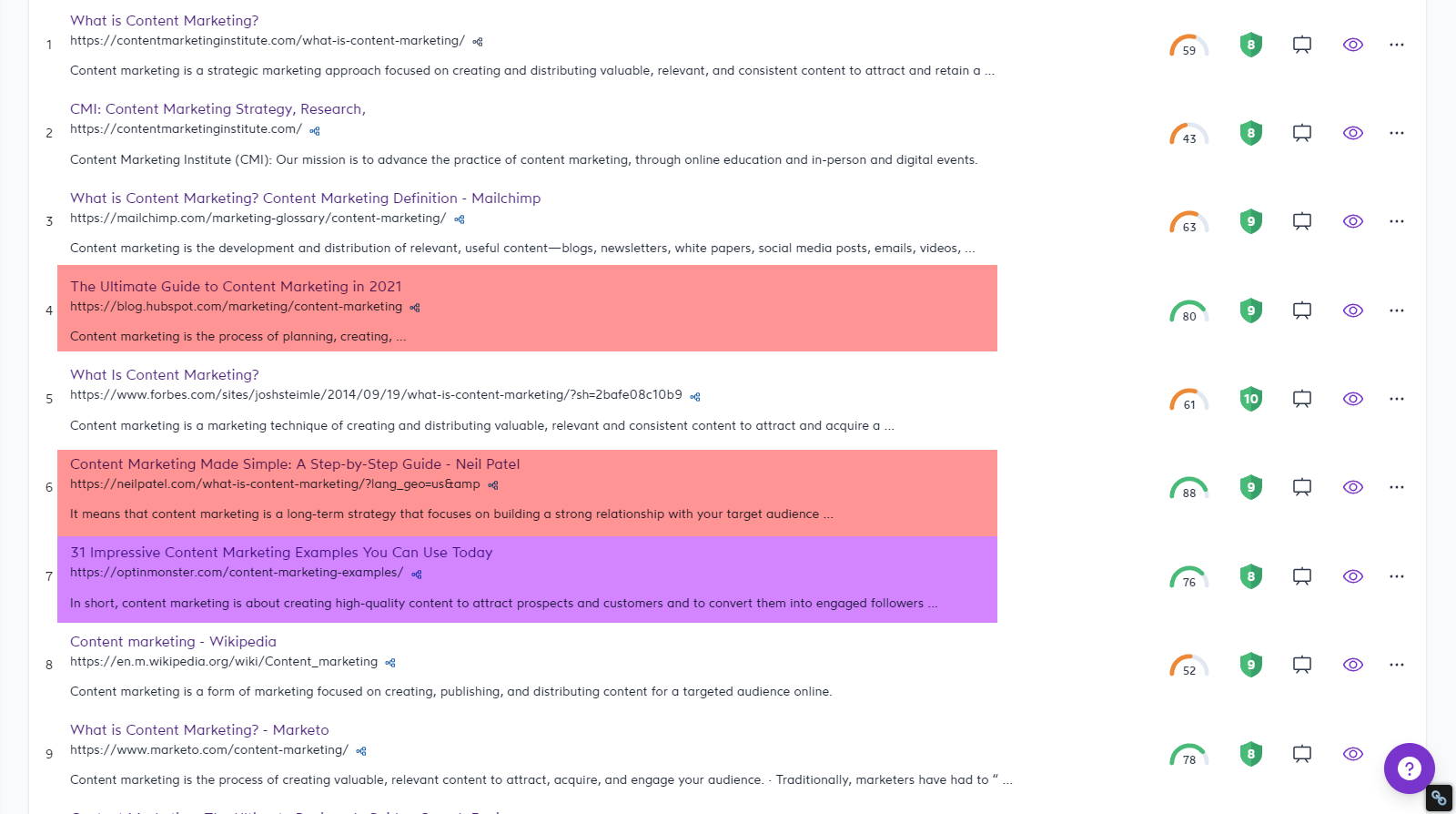
From this data, you should consider tweaking your post to lean toward answering the question, “what is content marketing.” This could help bring you back to Google’s good graces.
#4 – Made Technical Changes to Your Site
As your website grows, how you deliver content to your audience also changes.
Below are a few examples of the changes I’m referring to:
- Migrating your site to a new and improved web host to accommodate more visitors without compromising site speed.
- Using a content delivery network (CDN) to help load your site pages more efficiently on web browsers.
- You are transitioning to premium add-ons and plugins to supercharge your website.
- You are potentially redirecting an aged domain to your site.
- You are performing technical SEO to maximize your crawl budget.
- You are hiring and training a virtual assistant to manage your site while you’re busy with other vital matters.
These changes require technical setup to ensure that your site provides users with the best possible experience.
However, somewhere along the way, these changes could potentially impact your site’s SEO rankings, causing it to lose organic traffic in the process.
The issues you will encounter from the changes you plan on making vary wildly. So, it’s hard to provide you with an actual fix unless we have a clear idea of what’s causing the drop in rankings.
For example, if you change your hosting, you must fix the DNS records to point to the correct hosting. Otherwise, search engine crawlers and people won’t be able to access your website.
Other than that, the process should be straightforward since most web hosts allow you to migrate your website via a WordPress plugin. This will enable you to retain all your content and settings.
When it comes to handing the keys of your site to a VA, you want to prevent that person’s access to your settings. This helps you avoid the problem of inadvertently changing your SEO setup.
#5 – Targeted by an Algorithm Update
We already talked about how Google algorithm updates affect the website rankings for specific keywords.
However, there have been updates that specifically targeted tactics and practices that were harming the quality of SERPs.
Google Panda ended article marketing in 2011 that produced thin content ranking on top of SERPs.
The “Mobilegeddon” in 2015 favored mobile-friendly sites over static and unresponsive site designs.
The Medic Update, three years later, weeded out YMYL (Your Money, Your Life) sites in the health and finance niches from search results that certified experts did not create.
These updates aim to help users find the best page for their search query.
So, if you practiced any of the above, you have already been burned by Google before.
And while we wouldn’t know what the next algorithm update will focus on, you shouldn’t worry about getting burned again. As long as you provide value for your site to your audience while observing Google guidelines, you’re in the clear.
As the saying goes, prevention is better than cure.
How to get google rankings back if your positions dropped?
The best way to get rankings back if you have lost keyword ranking in July 2024 is:
- Create a comprehensive content audit
- Submit a Google Disavow File which is created by link audit specialist
- Improve existing content using surfer seo or marketmuse
- Improve silo structure as part of your technical seo audit
- Build fresh new safe backlinks via a link-building agency like Searcharoo
Conclusion
Let’s face it: Google ranking drops suck big time.
Nobody wants to rank lower for their target keyword, let alone drop out of SERPs, because Google decided.
However, you are at the mercy of search engines, especially if this is your primary source of website traffic.
In this case, you need to do everything to maintain your high rankings and avoid potential drop-offs soon.
And if your site experiences a Google rankings drop, take it as a wake-up call for your site to grow and learn from its failures.
By identifying potential issues your site is committing by following the post above, you can correct course now before it’s too late.
Searches Associated With SEO Ranking Drops
- website traffic dropped suddenly
- google ranking drop
- seo ranking dropped
- google rank dropped dramatically
- google ranking dropped dramatically
- my website ranking dropped
- my google ranking has dropped
- ranking dropped in google
- google ranking dropped dramatically after new website
- why did my google ranking drop
- google ranking dropped
- my google ranking suddenly dropped
- keywords ranking drop
- website traffic drop
- google ranking suddenly dropped

About FatRank
Our aim to explain and educate from a basic level to an advanced on SEO and Social Media Marketing.

